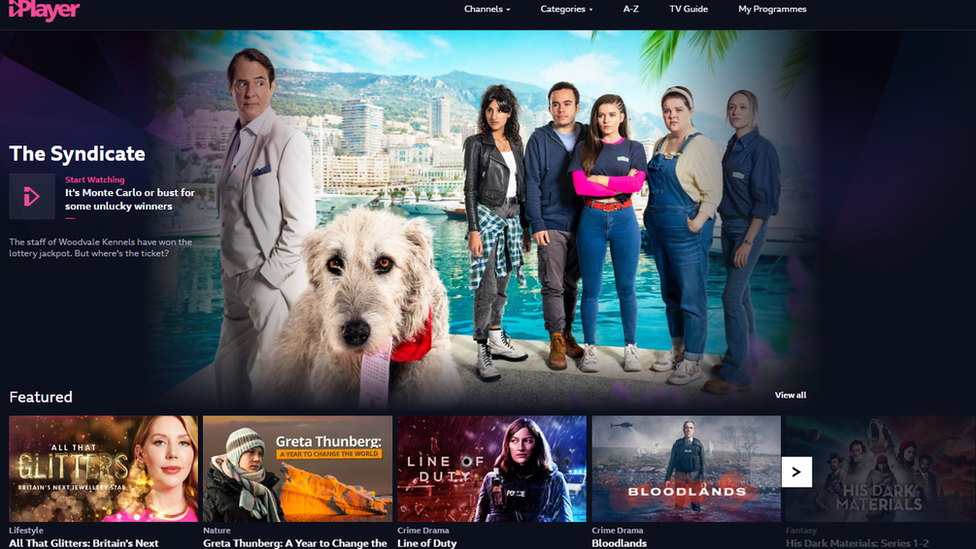Scottish election 2021: Labour pledge fund to pay TV licence for over 75s
- Published

Most over 75s now have to pay for a TV licence to access BBC services
Scottish Labour has unveiled plans to pay television licence fees or help cover broadband bills for the over-75s.
Leader Anas Sarwar said the "staying connected" policy would provide every household with people aged over 75 with the £159 cost of a TV licence.
Free TV licences for most over-75s ended in August after the UK government announced the BBC should bear the cost of the policy - in place since 1999.
Only those receiving the pension credit benefit are eligible for free licences.
Mr Sarwar said Holyrood had the powers to tackle the "national scandal" of pensioner poverty and ease the cost of the Tories' "broken promise" not to scrap the benefit, which was originally introduced by Gordon Brown's Labour government.

SCOTLAND ALERTS: Get extra updates on BBC election coverage

The fund, which Scottish Labour says would cost no more than £73.1m per year, would entirely cover the cost of the licence fee but could also be used to pay for broadband bills.
The BBC announced in February that the annual licence fee would increase from £157.50 to £159 from April 2021.
"For many older people, TV is a lifeline against loneliness and isolation," Mr Sarwar said.
"While the pandemic separated us all in our homes, the way many of us came together was over online video calls like Zoom. As we emerge from the worst of the public health crisis, it is essential that older people are not left behind in our recovery.
"It's right that the Scottish Parliament delivers support to ease the cost of that."
Latest figures from the Department for Work and Pension show there were 459,461 Scots over 75 who claimed the state pension, and therefore would previously have received a free TV licence.

SCOTLAND'S ELECTION: THE BASICS
What elections are happening? On 6 May, people across Scotland will vote to elect 129 Members of the Scottish Parliament (MSPs). The party that wins the most seats will form the Scottish government. Find out more here.
What powers does the Scottish Parliament have? MSPs pass laws on most aspects of day-to-day life in Scotland, such as health, education and transport. They also have control over some taxes and welfare benefits. Defence, foreign policy and immigration are decided by the UK Parliament.
How do I vote? Anyone who lives in Scotland and is registered to vote is eligible, so long as they are aged 16 or over on the day of the election. You can register to vote online, external.

Elsewhere on the campaign trail, the SNP laid out plans for wrap-around childcare all year round before and after school, and free early years education to be extended to all one and two-year-olds.
Those on the lowest incomes would pay nothing towards childcare, said first minister Nicola Sturgeon, with others making "a fair and affordable contribution".
"For many, this will make the difference between not being able to afford to work because of high childcare costs and being able to work or work longer, raising family incomes as a result," Ms Sturgeon said.

POLICIES: Who should I vote for?
PODLITICAL: Updates from the campaign

The Scottish Liberal Democrats called for music tuition to be made free in schools to encourage participation and equal access, a policy the SNP have also indicated will be included in their manifesto launch on Thursday.
The Lib Dems' education spokesperson Beatrice Wishart highlighted figures showing the number of pupils receiving tuition - a system currently run by local councils - is at its lowest level since annual surveys began.
Ms Wishart cited "astronomical charges" in areas like Clackmannanshire, where the annual cost is £524 for group lessons, while the number receiving tuition in West Lothian halved when fees of £354 per year were introduced.
"Scotland has a rich musical heritage, and I would hate to see that become the preserve of a select few," Ms Wishart added.

Douglas Ross and Ruth Davidson were in jovial mood as they launched a Conservative advertising van campaign
Former Scottish Conservative leader Ruth Davidson - who is leaving Holyrood to take up a seat in the House of Lords - joined current leader Douglas Ross in Edinburgh as the party launched an advertising campaign attacking the SNP's plans to hold a second independence referendum.
"We have got to focus on protecting jobs and building the country back from the last 12 months," Mr Ross said.
"The SNP are going to put all that under threat with another divisive independence referendum."
Meanwhile the Scottish Greens became the first of the larger parties to officially launch their election manifesto with a pledge to create more than 100,000 jobs as part of their plans for a "green economic recovery" from the Covid-19 pandemic.


Do you have a question about the Scottish Parliament election? Use the form below to send us your questions and we could be in touch.
In some cases your question will be published, displaying your name, and location as you provide it, unless you state otherwise. Your contact details will never be published. Please ensure you have read the terms and conditions.
If you are reading this page on the BBC News app, you will need to visit the mobile version of the BBC website to submit your question on this topic.